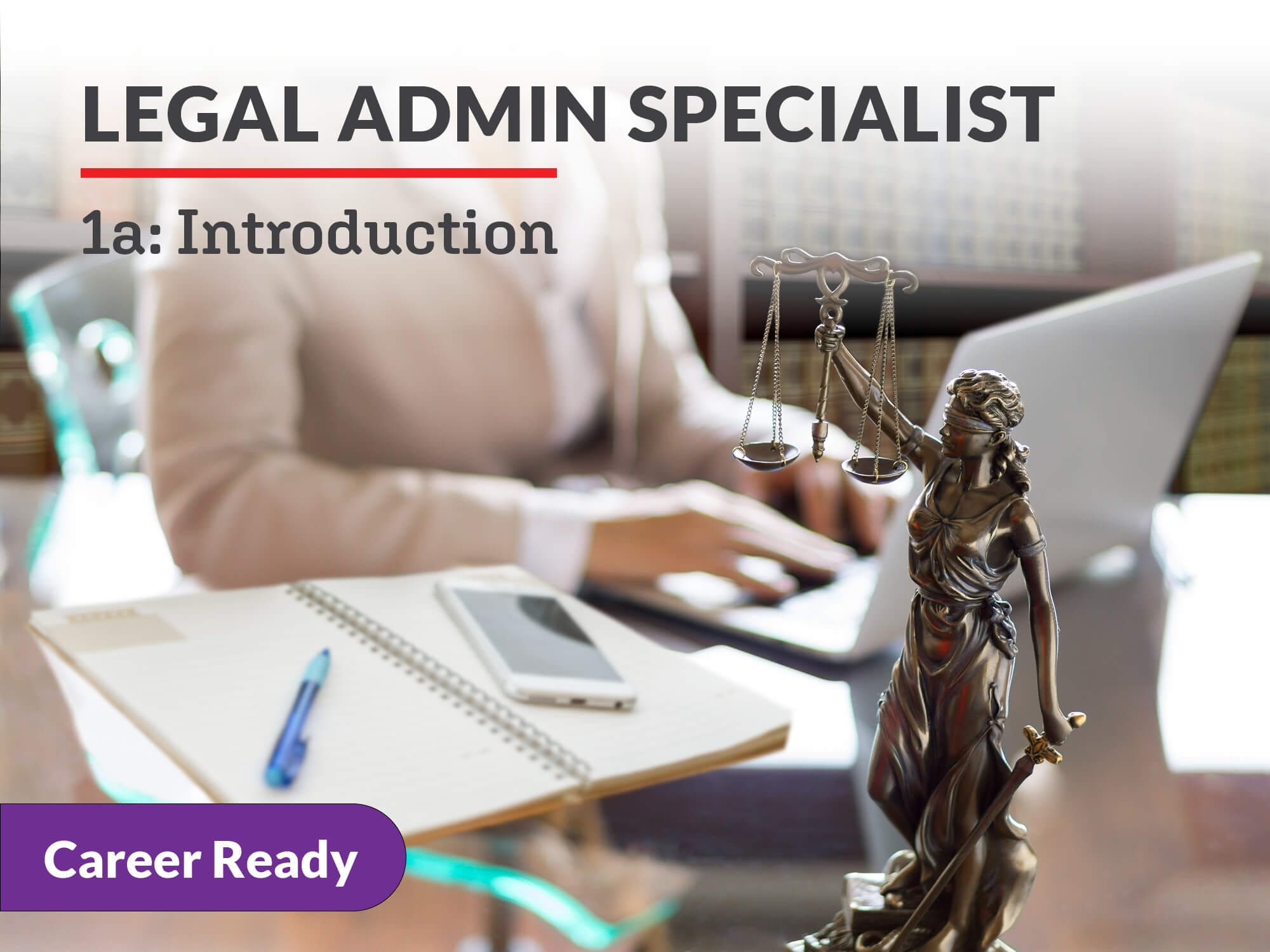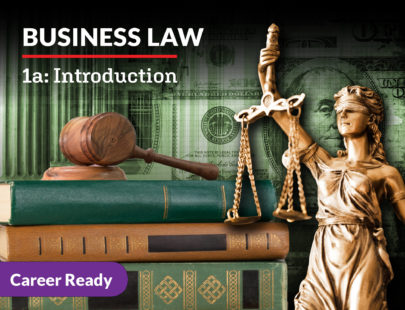
Legal Admin Specialist 1a: Introduction
Do you picture yourself working in a law office or maybe even in a courtroom someday? A rewarding career as a legal administrator means you are responsible for the day-to-day operations in a law firm, and therefore, need to learn the fundamentals of law. You’ll need to understand the specifics of researching, creating, processing, filing legal documents, and more. Jumpstart your career in law by learning what it takes to be a legal admin.
Units at a Glance
Unit 1: Legal Path: Past and Present
Do you know how our legal system works or what court personnel—the people who work inside a courtroom—actually do? In this unit, we will provide an overview of the law. Specifically, we will cover what a law is, where it comes from, why we have laws, and who enforces them. It’s empowering to know how the legal system works!
What will you learn in this unit?
- Explain the history of the law and what the law really does
- Identify the types of law, how laws are created out of practical necessity, and how they change over time
- Describe the American court system
- Outline the jurisdiction of the courts
- Articulate the responsibilities of the agencies in charge of enforcing our laws
- List the different functions of court personnel
Unit 2: Finding Your Place: Areas and Roles in Law
Have you ever wondered how many different areas of law there are or what kinds of offices lawyers practice in? Have you ever watched a legal TV drama and wondered about the staff that exists behind the scenes to support the impassioned prosecutors and defense attorneys? If you answered “yes” to any of these questions, you’re in luck. This unit is your introduction to the actual practice of law and how legal administrative specialists fit into the picture. There are so many areas of the law in which to practice, and new ones are forming every day. Because the world is becoming increasingly complex and reliant on technology as well as new regulations, there will be an ongoing need for legal services.
What will you learn in this unit?
- Describe the two major divisions of a law practice: litigation and transactions
- Explain different types of law practices
- List and compare various practice areas
- Identify the positions and roles within a law practice
Unit 3: Getting to Know the Legal Office
We are going to teach you everything you need to know about legal research and writing, including how to draft pleadings to file a lawsuit and keep track of your time so that you get paid! Legal writing is a special creature. Once you have mastered it, you will lie awake at night thinking up ways to persuade your parents and teachers about all your brilliant ideas. That’s how the legal world works. Use your ability to research, apply logic, and write persuasively to convince people of your position, and you will never go wrong.
What will you learn in this unit?
- Understand basic legal jargon, complaints, and answers
- Read and write case citations, which will help you know where to find the case law you need
- Do basic legal research and use the IRAC method to write a brief
- Structure your files and keep good records of every interaction with your client, including your billable time
Unit 4: Professional Pieces: Ethics, Confidentiality, and More
Most career fields are kept in check through the use of statutes, but law is a self-regulating industry. Did you know that banks are overseen by the US Department of the Treasury (SEC, FDIC, etc.) and must comply with state laws? Similarly, teachers are governed by the US Department of Education and local laws. The legal profession, however, is monitored almost exclusively by state bar associations and state supreme courts. Thus, the rules that apply to this field are created exclusively by those who participate in it. This is a great honor and a great responsibility. Let’s learn about what the rules are, who creates them, and why.
What will you learn in this unit?
- Tell the difference between morals and ethics, describing some specific rules regarding legal ethics
- List the basic requirements of competence and advocacy as well as identify the major components of a character and fitness examination
- Differentiate between confidentiality and privilege, explaining when each one applies
- Understand conflicts of interest and how they might disqualify a lawyer from some representation
- Avoid malpractice and jail by not engaging in the unauthorized practice of law
Unit 5: Working with Legal Documents
Whether it’s a legal brief to file with the court or a contract to sell a multi-million-dollar business, paperwork is an essential part of every law practice. Legal administrative assistants are heavily involved in drafting documents. Let’s take a look at each document category and learn some valuable tools of the trade to help your skills shine.
What will you learn in this unit?
- Use specific legal terminology correctly, and create a redline document to track your revisions
- Employ The Bluebook to format case citations correctly and proofread the work of the lawyers you support
- Create templates for legal instruments such as deeds
- Draft a reference manual for your office personnel to develop consistent policies related to documents
Unit 6: Office Essentials
Working in an office involves more than just sitting at a desk using your computer all day. You may not realize that the layout of the office is very intentional, and there can be policies in place about how you organize your own office or workspace. Additionally, technology now makes it possible to set up a virtual law office in some circumstances. Whether you work in a physical office or virtually from home, as a legal administrative assistant, you will need to understand all aspects of the office space as part of your job duties. This includes everything from office equipment like copiers and scanners to the cybersecurity practices needed to keep online information safe.
What will you learn in this unit?
- Identify the pros and cons of operating a virtual law office
- Create systems for tracking and ordering supplies for the entire office
- Discuss various client file organization options, including barcoding systems
- Articulate schemes for breaching cybersecurity and help prevent fraud or the loss of client information to hackers
Unit 7: Managing Time and Communication
Interacting with clients and coworkers will be a critical component of your work as a legal administrative specialist. Communication skills are among the most valuable tools you will have available to you to navigate every situation you may encounter. This ability to communicate effectively, coupled with time management strategies, will set you up for success in your legal career. Are you ready to get started?
What will you learn in this unit?
- Identify key characteristics of verbal and nonverbal communication
- Recognize different types of communication to improve your skills with your coworkers and clients
- Adopt effective time management practices, including the use of a detailed calendar system
- Manage your stress levels appropriately in the workplace and understand what resources are available to support you
Unit 8: Career Central: Landing a Job
Do you picture yourself working in a law office or maybe even in a courtroom someday? If so, you need to consider which avenue to take because there is a wide variety of opportunities available in the legal field. You might even think about going to law school at some point, but the legal profession is filled with people in many roles—not just lawyers. There are so many directions you could pursue! Let’s start with an in-depth look at several options and then learn exactly how to go about landing your dream legal job.
What will you learn in this unit?
- Identify a variety of career options in the legal field and the credentials required for each one
- Draft a resume to highlight your skills and experience
- Prepare yourself for a job interview
- Navigate the process of transitioning from your first job to your next job when you are ready
Required Materials
Physical
- Videorecording device
- Office props (desk or table, computer, paper supplies, files, pens, pencils, etc.)
Software
- Word processing software
- Presentation software
- Spreadsheet software
- Typing speed test software (i.e., www.typingtest.com/test.html)
Optional
- Digital calendar

